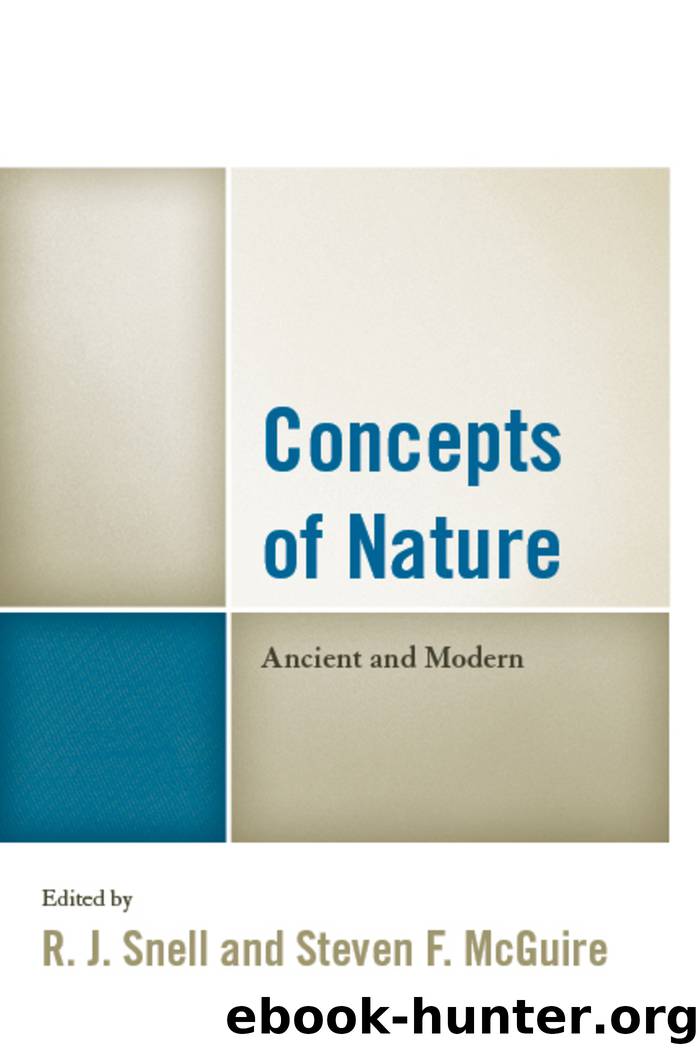Concepts of Nature by R. J. Snell Steven F. McGuire

Author:R. J. Snell,Steven F. McGuire
Language: eng
Format: epub
Tags: undefined
Publisher: Lexington Books, a division of Rowman & Littlefield Publishers, Inc.
Published: 2012-04-04T04:00:00+00:00
Finnis’s answer is at least well known in the field of analytic jurisprudence: settling upon which concepts are salient and worth investigating requires seeing the point of the actions, practices, and so forth that we are investigating to the agents engaged in them; but as these agents are variably situated and of differing degrees of intelligent investment in those actions and practices, we must adopt the standpoint of a practically reasonable agent, and indeed of the most practically reasonable agent. Descriptive social science thus has at its foundations normative identification of its concepts.[9] This is how we can discriminate between, for example, legitimate punishment on the one hand, and the extermination of enemies and scapegoating of losers on the other; between marriage and family as foundational for society on the one hand, and prostitution as a parasitic deviation from the norms that should govern love and romance on the other; and between the state, acting under constitutional authority in a regime governed by laws and not men on the one hand, and a petty tyranny, dedicated to putting down dissent while lining the pockets of the rulers on the other. In each of these contrasting pairs, it is the former concepts that are, or should be, central to the social sciences, even in their primarily descriptive and explanatory modes; and calling the realities picked out by the first of each pair of descriptions “natural” should not obscure from us that “natural” here means “reasonable: in line with the demands of human fulfillment as grounded in basic human goods.”[10]
So I agree with Stoner’s claim that the social sciences are in need of a reorientation, and I agree too that the reorientation is in some broad sense Aristotelian, and certainly Thomistic. But I suggest further that our understanding of what it means for an approach to be Aristotelian, and especially Thomistic, is itself in need of reorientation, away from the idea that, at least epistemologically, nature comes first. What comes first must be practical reason’s orientation, from the agent’s practical standpoint, to human goods, and to guiding choice reasonably in light of integral human fulfillment offered by those goods. This is critical not only to the lives of practical agents, but to the discipline of political science as well.
Download
This site does not store any files on its server. We only index and link to content provided by other sites. Please contact the content providers to delete copyright contents if any and email us, we'll remove relevant links or contents immediately.
| Anthropology | Archaeology |
| Philosophy | Politics & Government |
| Social Sciences | Sociology |
| Women's Studies |
The remains of the day by Kazuo Ishiguro(8977)
Tools of Titans by Timothy Ferriss(8366)
Giovanni's Room by James Baldwin(7330)
The Black Swan by Nassim Nicholas Taleb(7109)
Inner Engineering: A Yogi's Guide to Joy by Sadhguru(6785)
The Way of Zen by Alan W. Watts(6601)
Asking the Right Questions: A Guide to Critical Thinking by M. Neil Browne & Stuart M. Keeley(5759)
The Power of Now: A Guide to Spiritual Enlightenment by Eckhart Tolle(5755)
The Six Wives Of Henry VIII (WOMEN IN HISTORY) by Fraser Antonia(5498)
Astrophysics for People in a Hurry by Neil DeGrasse Tyson(5182)
Housekeeping by Marilynne Robinson(4436)
12 Rules for Life by Jordan B. Peterson(4299)
Double Down (Diary of a Wimpy Kid Book 11) by Jeff Kinney(4261)
Ikigai by Héctor García & Francesc Miralles(4247)
The Ethical Slut by Janet W. Hardy(4242)
Skin in the Game by Nassim Nicholas Taleb(4239)
The Art of Happiness by The Dalai Lama(4125)
Skin in the Game: Hidden Asymmetries in Daily Life by Nassim Nicholas Taleb(3991)
Walking by Henry David Thoreau(3953)
